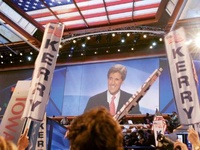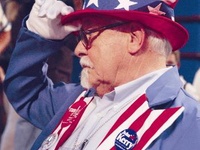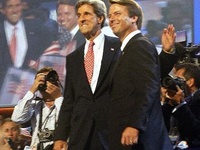Recent controversial works including Michael Moore’s Fahrenheit 9/11 and House of Bush, House of Saud by former Crimson editor Craig Unger ’71 have focused national scrutiny on the current administration’s cozy relationship with the Arab nation’s rulers, but Kerry’s more mainstream approach had previously steered clear of such territory.
Toward the end of his remarks, Kerry tempered these salvos with a remarkably direct address to President Bush that still strove to avoid a negative tone, in keeping with the convention’s general tenor of strength in cooperative unity.
“I want to address these next words directly to President George W. Bush,” he said. “In the weeks ahead, let’s be optimists, not just opponents. Let’s build unity in the American family, not angry division. Let’s honor this nation’s diversity; let’s respect one another; and let’s never misuse for political purposes the most precious document in American history, the Constitution of the United States.”
The last sentence was Kerry’s lone, particularly oblique reference to the Constitutional amendment banning same-sex marriage proposed by Congressional Republicans and supported by President Bush. But even this came as something of a surprise in a week where the issue was largely invisible in major speeches.
In describing his proposed policies on health care, labor, taxes and energy, Kerry showed an unsurprisingly populist attitude on issues involving class.
Reciting a Clintonian litany of anecdotes about ordinary Americans struggling to make ends meet, Kerry offered solutions in the form of a simple refrain echoing Wednesday’s speech by his running mate, Sen. John R. Edwards, D-N.C.
“America can do better,” Kerry said over and over again. “And help is on the way.”
“We can do better and we will,” Kerry said at another point. “We’re the optimists.”
But when it came to his own life, the Yale-educated candidate was up-front about his privileged background—mentioning that he grew up in a two-parent home, never having faced the economic challenges he vowed to address.
“The story of people struggling for health care is the story of so many Americans,” Kerry said. “But you know what, it’s not the story of senators and members of Congress. Because we give ourselves great health care and you get the bill. Well, I’m here to say, your family’s health care is just as important as any politician’s in Washington D.C.”
The frank comparison of classes, recalling both the senator’s own past rhetoric on the campaign trail and former president Bill Clinton’s sharper digs at the Bush tax cuts on Monday night, countered criticism of Kerry as an aristocratic New England liberal.
Kerry also met head-on Republican claims that his views on important issues have been inconsistent, suggesting that his evolving positions reflect an intellectual, detail-conscious approach.
“Now I know there are those who criticize me for seeing complexities—and I do—because some issues just aren’t all that simple,” Kerry said before turning those criticisms around on his opponent, who he implied has neglected the truth to stay on-message. “Saying there are weapons of mass destruction in Iraq doesn’t make it so. Saying we can fight a war on the cheap doesn’t make it so. And proclaiming, ‘Mission accomplished’ certainly doesn’t make it so.”
But for all his attacks on Bush, Kerry still spent a good deal of time at the podium striving to avoid the impression of partisanship.
In one notable passage, Kerry discussed the terrorist attacks of Sept. 11, 2001 in terms of the unity they engendered among Americans rather than using them as an opportunity to bash Bush.
Read more in News
Mahan Unveils New Harvard-Yale Game Plan

















